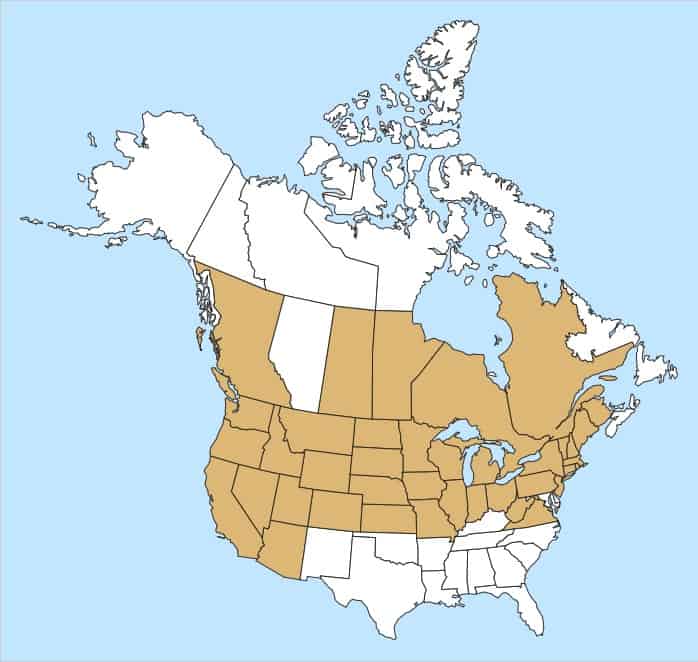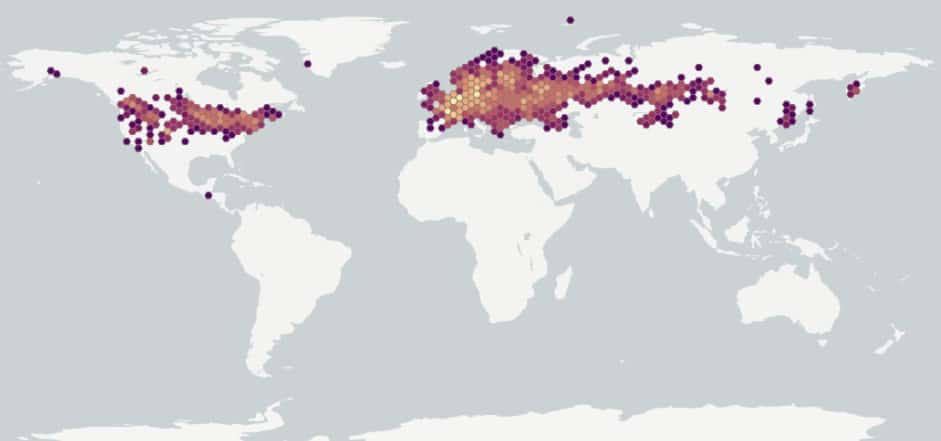Berteroa incana
Overview
Aperçu
Regulation :
Remarques Réglementation:
- CFIA Weed Seeds Order - Class 2: Primary Noxious Weed Seeds
Regulation Notes:
Distribution :
Répartition :
Native to east central Europe and Asia and introduced to North America and other parts of Europe (USDA-ARS 2021). Occurs in most of Canada except for Newfoundland, Prince Edward Island, Yukon and Nunavut (Brouillet et al. 2010+).
Habitat and Crop Association :
Habitat et Cultures Associées :
Cultivated fields, old fields, pastures, hayfields, meadows, grasslands, woodlands, streambanks, roadsides, railways, turf and disturbed areas (FNA 1993+; Darbyshire 2003; Warwick and Francis 2006).
Economic Use, cultivation area, and Weed Association :
Utilisation économique, zone de culture et association de mauvaises herbes :
Duration of Life Cycle :
Durée du cycle vital:
Annual or perennial
Dispersal Unit Type :
Type d’unité de dispersion :
Seed
General Information
RENSEIGNEMENTS GÉNÉRAUX
Berteroa incana is a short lived perennial and thrives on dry, calcareous, disturbed soils of low fertility (Parkinson et al. 2010). It grows in a variety of habitats and is able to compete with native plants (Warwick and Francis 2006).
Seed is dispersed by valves in the silicle and falls near the parent plant. Some wind and water dispersal may occur as the seed is light and has a winged margin (Parkinson et al. 2010).
.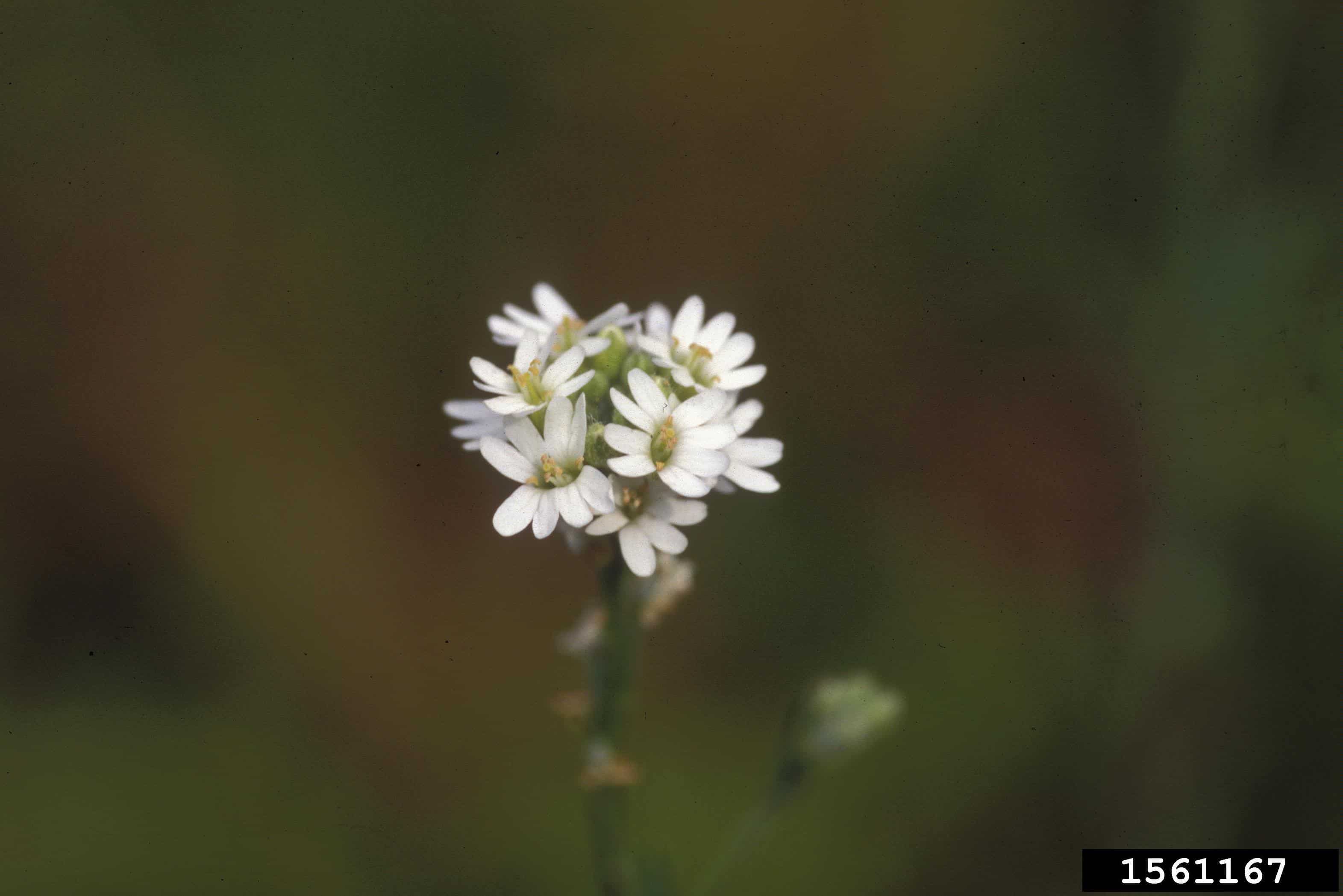
Berteroa incana flowers (Catherine Herms, The Ohio State University, Bugwood.org)
Identification
Identification
-
Silicle
Size
- Silicle length: 5.0 – 8.5 mm; width: 2.5 – 4.0 mm (FNA 1993+)
Shape
- Silicle is oval shaped, rounded at both ends, compressed in 3 dimensions
Surface Texture
- Silicle surface is smooth, covered in a mix of stellate hairs and simple hairs
Colour
- Silicle is dull straw yellow
Other Features
- The style remnant remains on the silicle, on the end opposite the stalk, length 1.0 – 4.0 mm (FNA 1993+; Warwick and Francis 2006)
- Silicle contains 4 – 12 seeds in 2 rows (Warwick and Francis 2006)
- Silicle is shiny green when immature
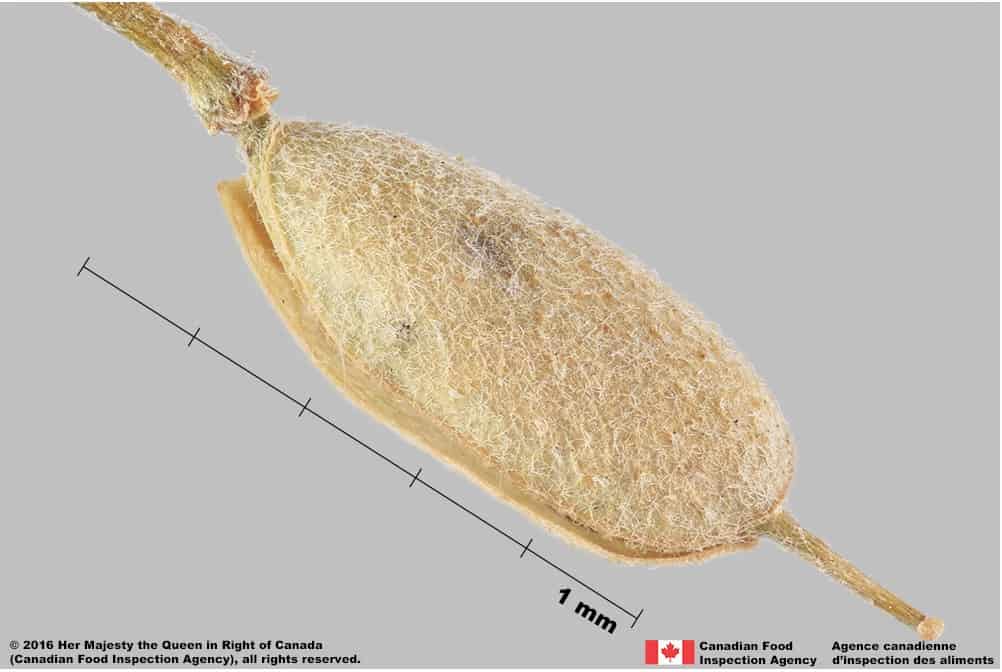
Hoary alyssum (Berteroa incana) pod

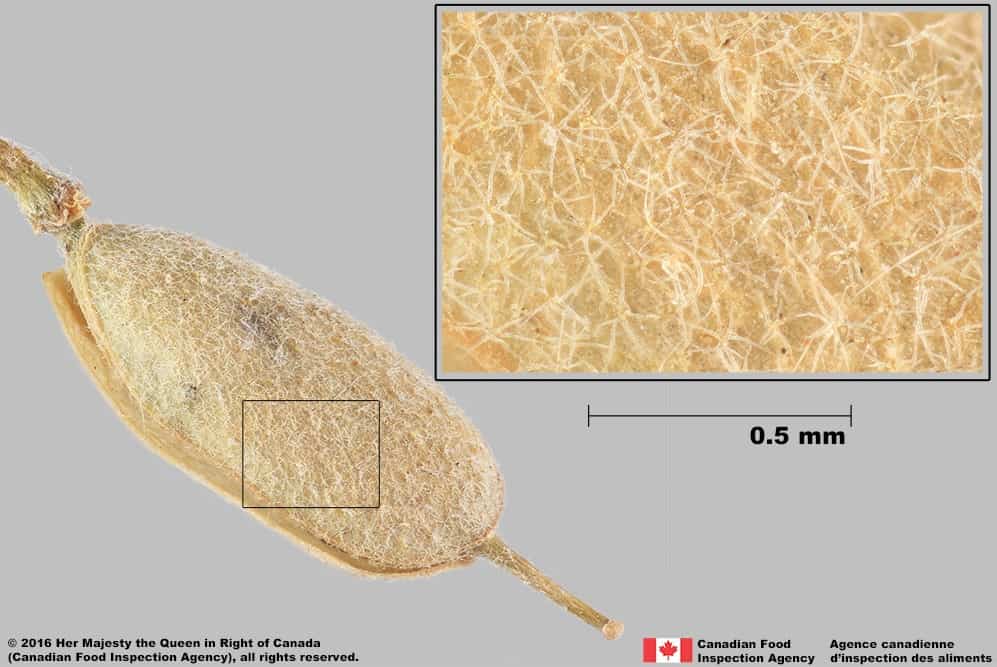
-
Seed
Size
- Seed length*: 1.2 – 2.2 mm; width: 0.9 – 1.8 mm
*Note: minimum and maximum of 20 seeds in a normal range of this species using image measurement (ISMA 2020)
Shape
- Seed is round or oval shaped, flattened in edge view
- A narrow wing is around the margin of the seed
Surface Texture
- Seed surface with dense reticulations and small interspaces
Colour
- Seed is shiny dark reddish-brown
Other Features
Hilum & Hilum area
- Hilum is in a V-shaped notch at one end filled with white tissue
- A curved groove extends part of the way along the seed from the hilum area towards the other end of the seed, separating cotyledons from the radicle
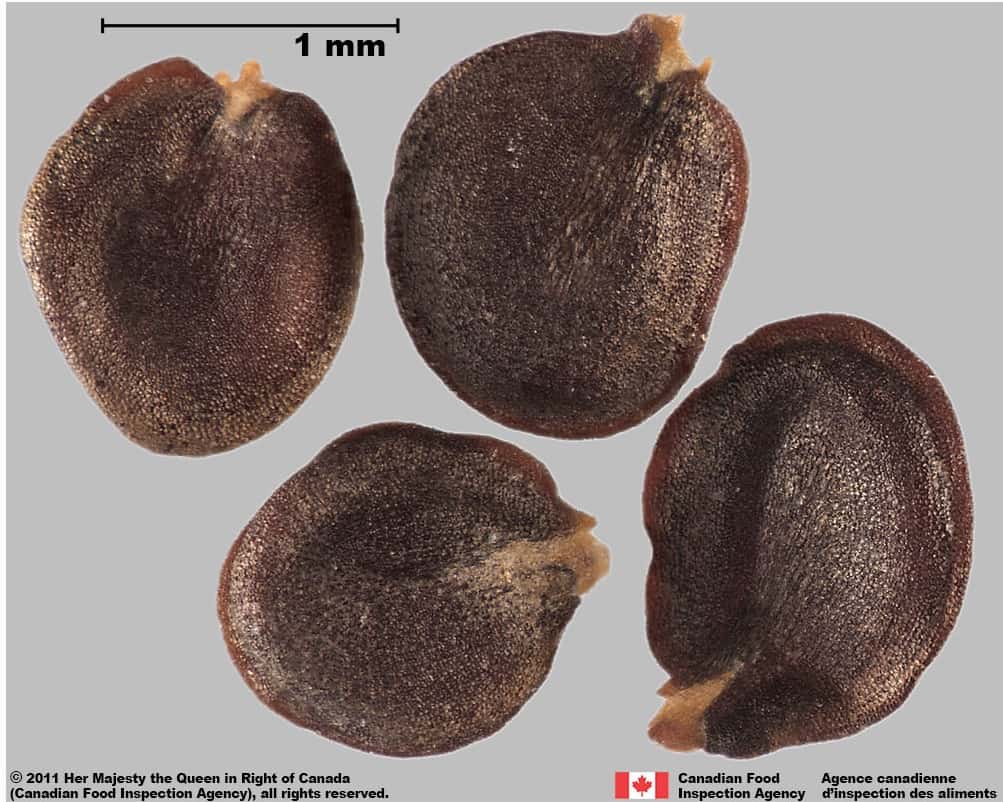
Hoary alyssum (Berteroa incana) seeds

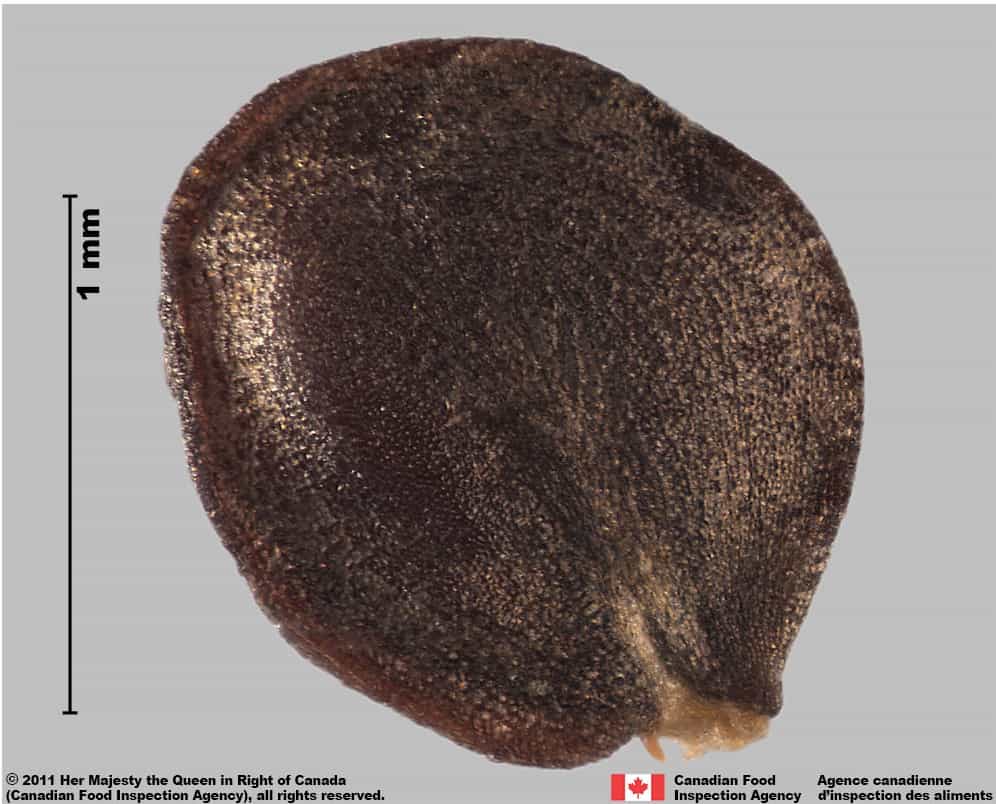
-
Embryo
Size
- Embryo fills the seed
Shape
- Embryo is bent
Endosperm
- Endosperm is scant or lacking, nutritive tissue contained within cotyledons
Other Features
- Cotyledons are oval shaped, hard and orange coloured
Identification Tips
CONSEILS POUR L’IDENTIFICATION
There are many species in the Brassicaceae that have round, flattened seeds that are winged around the outside. The seeds of Berteroa incana are distinguished by the combination of: flattened in edge view, dark reddish brown colour, surface with dense reticulations, small interspaces and the hilum in a V-shaped notch.

Hoary alyssum (Berteroa incana) seed


Additional Botany Information
AUTRES RENSEIGNEMENTS BOTANIQUES
Similar Species
ESPÈCES SEMBLABLES
Similar species are based on a study of seed morphology of various species, and those with similar dispersal units are identified. The study is limited by physical specimen and literature availability at the time of examination, and possibly impacted by the subjectivity of the authors based on their knowledge and experience. Providing similar species information for seed identification is to make users aware of similarities that could possibly result in misidentification.
Alyssum alyssoides (L.) L.
A. alyssoides seeds are generally smaller than B. incana seeds (length*:1.3 – 1.6 mm; width: 0.9 – 1.6 mm), oval shaped, translucent, light reddish-brown coloured, and a stippled surface texture. B. incana seeds are round or oval shaped, dark reddish brown coloured and have a reticulate surface texture.
*Note: minimum and maximum of 10 seeds in a normal range of this species using image measurement (ISMA 2020)
Click to select species
Cliquez pour sélectionner les espèces
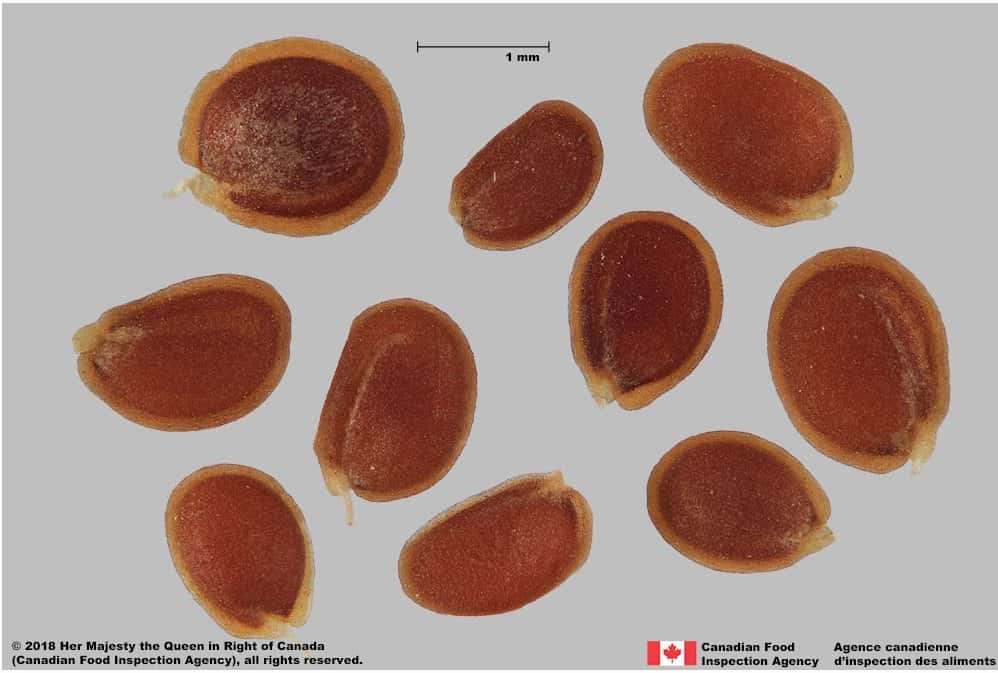
Alyssum alyssoides
Comparison Window
Fenêtre de comparaison
MAIN SPECIES
ESPÈCES PRINCIPALES
Berteroa incana

Berteroa incana
Brassicaceae
Hoary alyssum (Berteroa incana) seeds
MAIN SPECIES
ESPÈCES PRINCIPALES
Berteroa incana

Berteroa incana
Brassicaceae
Hoary alyssum (Berteroa incana) seed
MAIN SPECIES
ESPÈCES PRINCIPALES
Berteroa incana

Berteroa incana
Brassicaceae
Hoary alyssum (Berteroa incana) pod
MAIN SPECIES
ESPÈCES PRINCIPALES
Berteroa incana

Berteroa incana
Brassicaceae
Hoary alyssum (Berteroa incana) pod surface
SIMILAR SPECIES
ESPÈCES SEMBLABLES
Alyssum alyssoides

Alyssum alyssoides
Brassicaceae
Small alyssum (Alyssum alyssoides) seeds
SIMILAR SPECIES
ESPÈCES SEMBLABLES
Alyssum alyssoides
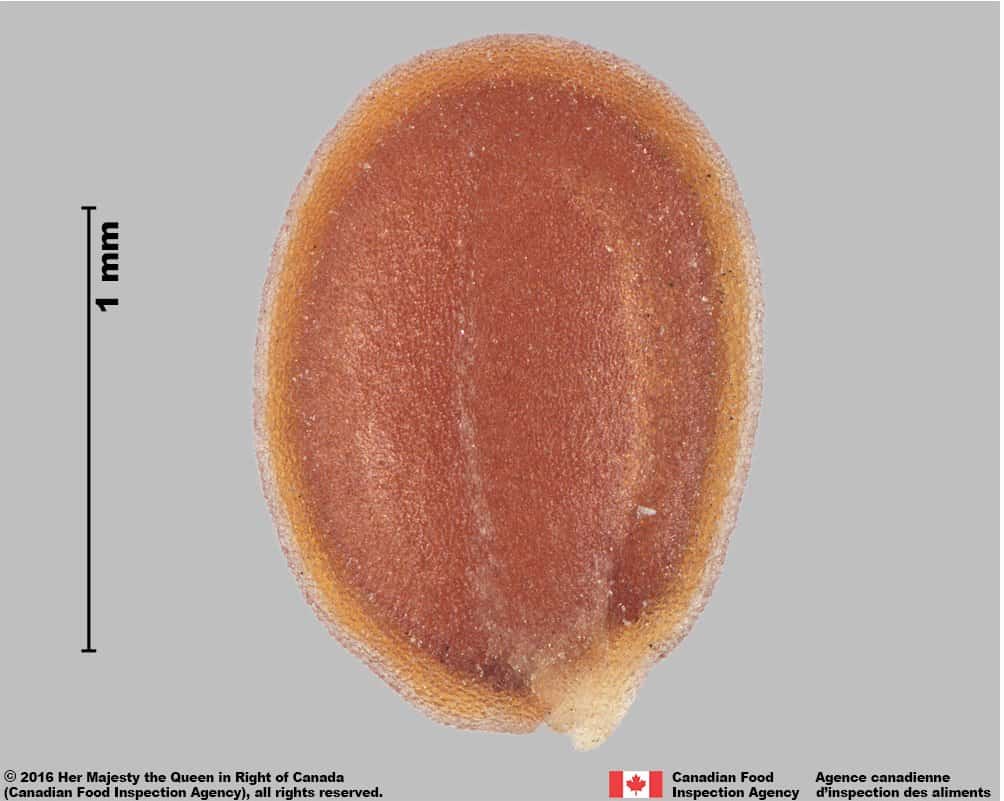
Alyssum alyssoides
Brassicaceae
Small alyssum (Alyssum alyssoides) seed
SIMILAR SPECIES
ESPÈCES SEMBLABLES
Alyssum alyssoides
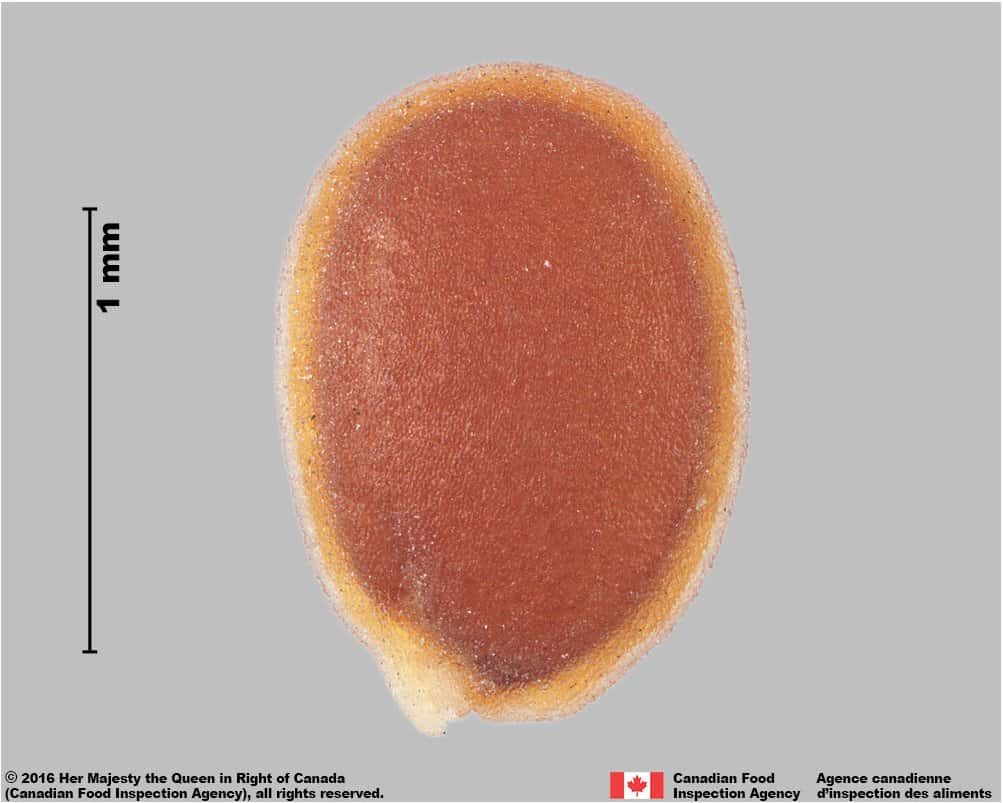
Alyssum alyssoides
Brassicaceae
Small alyssum (Alyssum alyssoides) seed
SIMILAR SPECIES
ESPÈCES SEMBLABLES
Alyssum alyssoides
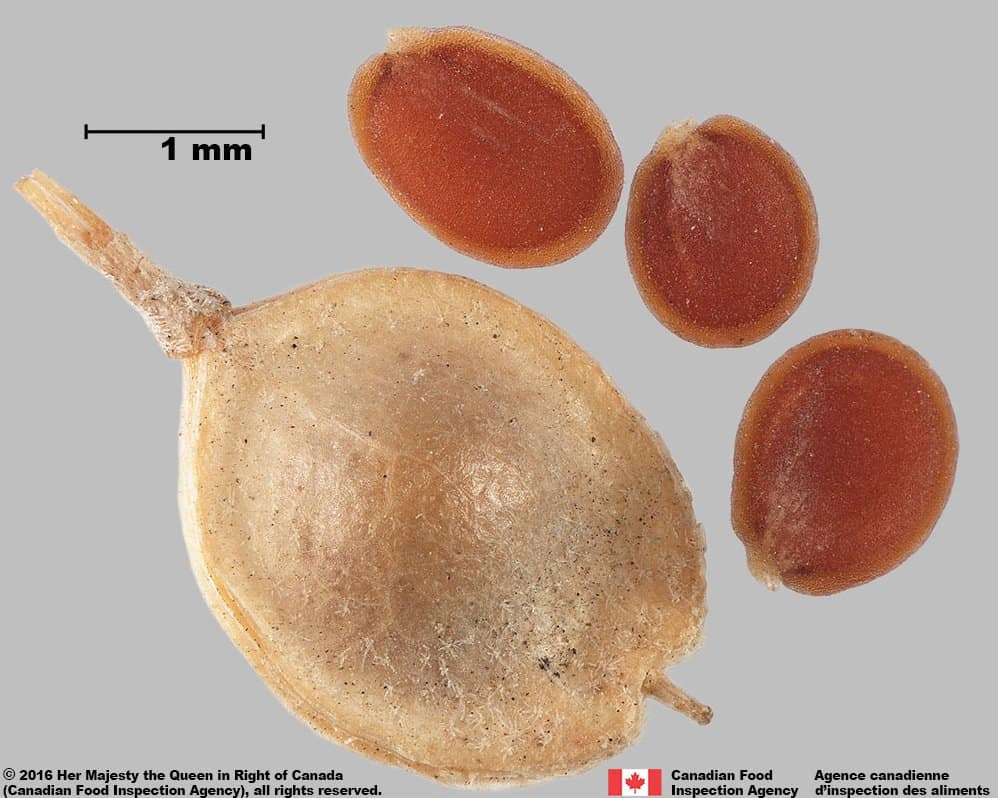
Alyssum alyssoides
Brassicaceae
Small alyssum (Alyssum alyssoides) seeds and pod
Need ID Help?
Besoin d’aide pour l’identification?
Reference(s)
Référence(s)
Brouillet, L., Coursol, F., Meades, S. J., Favreau, M., Anions, M., Bélisle, P. and Desmet, P. 2010+. VASCAN, the database of vascular plants of Canada. http://data.canadensys.net/vascan/ Accessed April 26, 2021.
Darbyshire, S. J. 2003. Inventory of Canadian Agricultural Weeds. Agriculture and Agri-Food Canada, Research Branch. Ottawa, ON.
Flora of North America (FNA) Editorial Committee, eds. 1993+. Flora of North America North of Mexico [Online]. 22+ vols. New York and Oxford. http://beta.floranorthamerica.org. Accessed December 29, 2022.
Global Biodiversity Information Facility (GBIF) Secretariat. 2022. https://doi.org/10.15468/39omei Accessed via https://www.gbif.org/species/3053522 Accessed December 29, 2022.
Government of Canada (GC). 2016. Canadian Weed Seeds Order. https://laws-lois.justice.gc.ca/eng/regulations/SOR-2016-93/page-2.html (English) https://laws-lois.justice.gc.ca/fra/reglements/DORS-2016-93/page-2.html (French)
International Seed Morphology Association (ISMA). 2020. Method for Seed Size Measurement. Version 1.0. ISMA Publication Guide. https://www.idseed.org/authors/details/method_for_seed_size_measurement.html
Parkinson, H., Mangold, J. and Jacobs, J. 2010. Biology, ecology, and management of hoary alyssum (Berteroa incana L.) Montana State University Extension, http://msuextension.org/publications/AgandNaturalResources/EB0194.pdf Accessed April 26, 2021.
U.S. Department of Agriculture-Agricultural Research Services (USDA-ARS). 2021. Germplasm Resources Information Network (GRIN), https://npgsweb.ars-grin.gov/gringlobal/taxon/taxonomysimple.aspx Accesse April 26, 2021.
Warwick, S. I. and Francis A. 2006. The Biology of Invasive Alien Plants in Canada. 6. Berteroa incana (L.) DC. Canadian Journal of Plant Science 86: 1297–1309.



